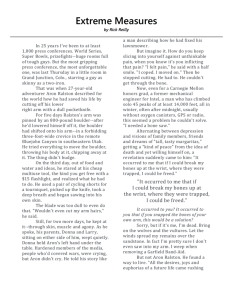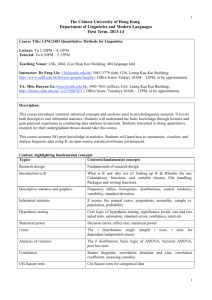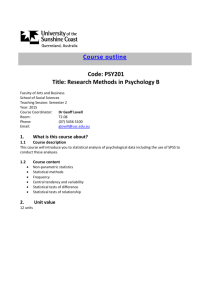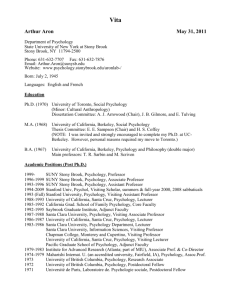Psych 10 Research and Data Analysis in Psychology
advertisement
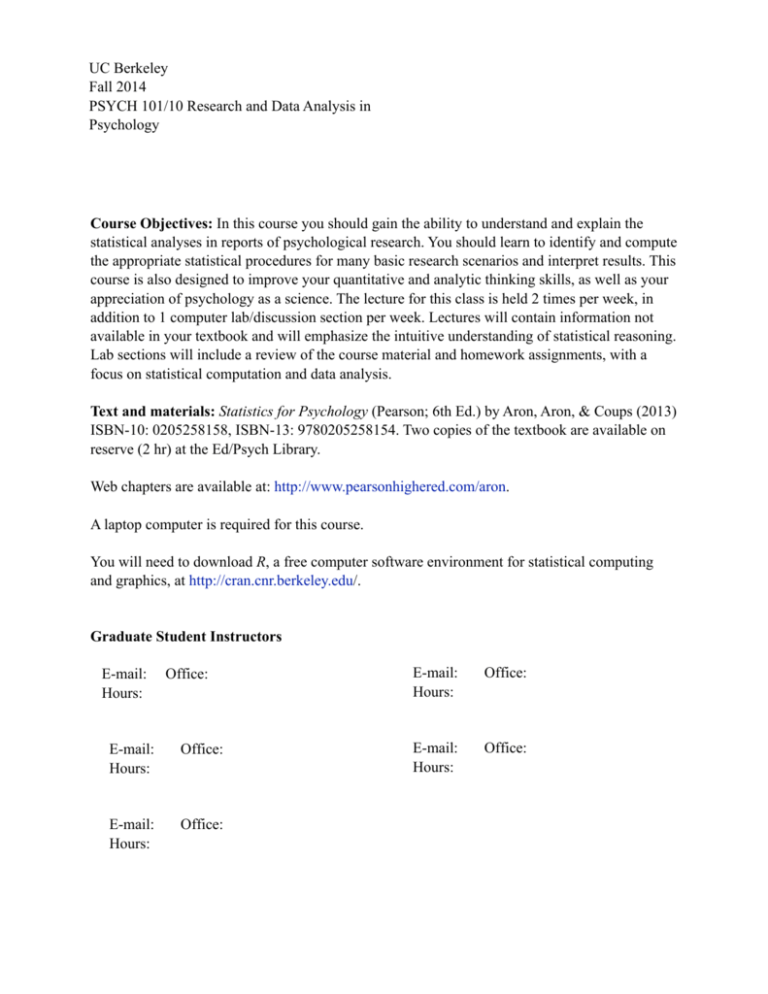
UC Berkeley Fall 2014 PSYCH 101/10 Research and Data Analysis in Psychology Course Objectives: In this course you should gain the ability to understand and explain the statistical analyses in reports of psychological research. You should learn to identify and compute the appropriate statistical procedures for many basic research scenarios and interpret results. This course is also designed to improve your quantitative and analytic thinking skills, as well as your appreciation of psychology as a science. The lecture for this class is held 2 times per week, in addition to 1 computer lab/discussion section per week. Lectures will contain information not available in your textbook and will emphasize the intuitive understanding of statistical reasoning. Lab sections will include a review of the course material and homework assignments, with a focus on statistical computation and data analysis. Text and materials: Statistics for Psychology (Pearson; 6th Ed.) by Aron, Aron, & Coups (2013) ISBN-10: 0205258158, ISBN-13: 9780205258154. Two copies of the textbook are available on reserve (2 hr) at the Ed/Psych Library. Web chapters are available at: http://www.pearsonhighered.com/aron. A laptop computer is required for this course. You will need to download R, a free computer software environment for statistical computing and graphics, at http://cran.cnr.berkeley.edu/. Graduate Student Instructors E-mail: Hours: Office: E-mail: Hours: Office: E-mail: Hours: Office: E-mail: Hours: Office: E-mail: Hours: Office: Lab Section Schedule Section 101 102 103 104 105 106 107 108 109 110 Weekday Monday Monday Tuesday Tuesday Wednesday Wednesday Wednesday Thursday Friday Friday Time 10 - 12 PM 12 - 2 PM 12 - 2 PM 2 - 4 PM 9 - 11 PM 11 – 1 PM 1 – 3 PM 1 – 3 PM 10 – 12 PM 12 – 2 PM Computer lab sections meet in 1535 TOLMAN (Tolman Microcomputer Facility) Attendance at and active participation in laboratory sections are required for 15% of your grade. In each lab section you will be required to complete an activity and submit it or show it to your GSI for participation credit. Drop-in time is available anytime the lab is open but a class is not scheduled. You can use these drop-in times to finish your homework (as needed) and to work on the data analysis for your final project. The room is open M-Th 9a-6p and F 9a-5p. For the Tolman lab, each half of the room is scheduled separately, so there are many drop-in hours. They are posted weekly at (TMFa and TMFb): http://facility.berkeley.edu/labs/hourstmf.html. There is no food or drink allowed, though closed water bottles may be placed on the floor. Exams: There will be four exams, each worth 90 points (15% of your grade). Exams will cover material in the assigned readings, the lectures and the lab. The exams will be cumulative, but will be weighted toward the most recent material. You will be allowed to bring one page of notes (double sided, 8.5 x 11 inch paper, hand-written) and a calculator to each exam. You are expected to abide by all the rules and regulations governing student conduct and ethical academic behavior issued by the Student Conduct Office http://sa.berkeley.edu/code-of-conduct. Because of the homework assignment replacement option (see below), no late, early or make-up exams will be offered. Should an emergency, extra curricular activity, family event, or similar prevent you from taking a scheduled exam at the scheduled time, you may replace the exam score with your homework score. Homework: There will be 10 homework assignments designed to help you learn. Assignments will be worth 9 points each (adding up to 90 points total: 15% of your grade). Due dates are provided on the bottom of this syllabus. Each assignment will be announced in lecture and posted online. You have the option of completing homework or avoiding it all together. If you choose to complete homework, your assignments point total can be used to replace your lowest exam score. If the homework adds up to less than the total points earned on your lowest exam, your homework score will be omitted from your final grade calculation. Because of this option, late work will not be accepted under any circumstances. If you will miss a class (due to emergency, extra curricular activity, family event, or similar), find a way to submit the assignment before the due date or through another channel. Assignments are to be submitted on the due date in lecture at the start of class. Course Project: Instead of taking a final exam in this class, you will be completing a final project. The final project will require you to demonstrate an understanding of research design, methodology, and data analysis in by conducting your own research. This project is worth 120 points (20% of your grade). See the course project description document for details. RPP: Our class will participate in the Research Participation Program. For 3 hours of research participation, you will receive 3 RPP credits. This required participation counts for 5% of the grade. To learn how to create an RPP account and start participating in experiments, visit http:// psychology.berkeley.edu/rpp/ and click on "Important Information for Students." If you have any questions, contact RPP at rpp@berkeley.edu. Grades: Grades are based on performance in the labs, your final project, RPP, and exams. Computer Lab RPP Exams (Homework) Final Project % of grade 15% 5% 60% (4 at 15% each) (15%) 20% points possible 90 30 360 (90) 120 total=600 Your course grade will be based on an absolute scale: Letter Grade A+ A AB+ B BC+ C CD F Minimum Percent 98 93 90 88 83 80 78 73 70 60 0 NOTE: We cannot accept extra credit or make any special arrangements regarding grades, or adjust grades due to special circumstances of any kind. Please do NOT ask for any adjustments to your grade (other than for errors in grading). Calculators: You are strongly encouraged to use a hand calculator for your assignments and during exams. I would prefer you spend your time developing an understanding of the statistical concepts than adding and dividing by-hand. A simple calculator that adds, subtracts, divides, multiplies, and takes square roots is all you need. You must show your work on all assignments and exams. Thus, calculators that also do statistical calculations will be of little help (they could even hurt—sometimes the way they compute things is different from the method you will learn). Calculators will be allowed for exams, but they must not be part of a phone or any other electronic device that can store data, connect with the Web, or communicate with others (such as by text or email). A note on how to succeed in this course: You do not need to have the intellectual capacity of Einstein to be successful in this course. The course does not emphasize mathematics; there will be many calculations, but these require nothing more than elementary algebra. The emphasis, instead, is on understanding the logic of the statistical methods. However, effort, vigilance, and a positive attitude will be essential for success and appreciation of the material. “A” students typically report preparing for exams at least 2 weeks ahead of time and begin drafting their final papers 4 weeks ahead of time. Gradefocused conversations are welcome when they are proactive (still enough time in the course to impact a grade), realistic (the math adds up), and framed around concrete goals for the course (needing an A to get into graduate school is not a reason for conversations about grading, but wanting to achieve content/skill mastery is). If you find yourself falling behind and feel you need extra attention, you are encouraged to use the services of the Student Learning Center (SLC), http://slc.berkeley.edu, where you can seek the additional support needed to reach your course goals. Methods of learning: 1. Reading the assigned material, which includes following the numeric examples closely and writing down questions about anything not entirely clear to you. Reading statistics requires close study and re-reading, not just reading through once as you might an ordinary book. You will also find it helpful to complete the How Are You Doing? sections. 2. Completing the any assigned homework. Statistics is a skill— it is necessary to DO statistics, not just read and understand. 3. Attending lectures, listening closely, asking questions—being sure to have done the reading first. DON'T fall behind! 4. Attending discussion sections led by GSIs—be sure to bring questions from the reading with you. This is your chance to get real help with what is not completely clear and to pursue deeply whatever has excited you. (Yes, there can be exciting things in statistics!) 5. Studying for, taking, and reviewing answers for exams. 6. Testing your knowledge and reviewing lectures using the online supplement, MyStatLab, at http://www.pearsonhighered.com/aron and http://www.mystatlab.com. Lecture and Exam Schedule: This lecture schedule is subject to change as needed during the semester. Lecture slides will be posted in the bCourse before the start of each class. These lecture slides may be updated after class to reflect needed changes. Readings from the text should be completed before the corresponding lecture. Week Date Topic Reading 1 Introduction and the Scientific Method Aron Web ch. 1 2 Research Design in Psychology 3 4 Variables and Displaying Data Aron ch. 1 Describing Data (central tendency, variability, etc.) Aron ch. 2 Measures of Variability and the Normal Distribution Aron ch. 3 Sampling Distributions and Hypothesis Testing Aron ch. 3 *Hmwk 1 due *Hmwk 2 due Exam 1 5 6 7 8 Hypothesis testing and the Central Limit Theorem Aron ch. 4 (108-120; 125-131) The Sampling Distribution of the Mean Aron ch. 5 (139-158) Z-test, Directional Hypotheses, and Decision Errors Aron ch. 6 (177-189) Decision Errors and Power Aron ch. 6 (189-214) Power and Effect Size Aron ch. 6 (214-218) T-Distribution and One-sample t-Test Aron ch. 7 (226-240) Experimental Designs, Dependent t-Test, and Confidence Intervals Aron ch. 7 (240-258); ch. 5 (158-166) *Hmwk 3 due *Hmwk 4 due *Hmwk 5 due Exam 2 9 10 11 Independent Samples t-Test Aron ch. 8; Aron Web ch. 2 ANOVA Logic and Assumptions Aron ch. 9 (316-337; 345-348) ANOVA calculations Aron ch. 9 (337-345; 349-358) Factorial Design and Interaction Effects Aron ch. 10 (377-393) Interactions and Adding Factors Aron ch. 10 (393-418); optional: Aron Web ch. 3 *Hmwk 6 due *Hmwk 7 due Exam 3 12 Correlation Aron ch. 11 (439-450) 13 Correlation and Regression Logic Aron ch. 11 (451-477); ch. 12 (493-512) Prediction and Error Aron ch. 12 (512-525) 14 Non-parametric Statistics and Chi-Square 15 Chi-Square & General Linear Model Aron ch. 13 (542-553); ch. 14 (585-605) Aron ch. 13 (553-569); optional: Aron Web ch. 4 Exam 4 17 Final Papers Due at 3pm *Hmwk 8 due *Hmwk 9 due *Hmwk 10 due CAMPUS POLICIES AND GUIDELINES 1. ACCOMMODATION OF RELIGIOUS CREED In compliance with Education code, Section 92640(a), it is the official policy of the University of California at Berkeley to permit any student to undergo a test or examination, without penalty, at a time when that activity would not violate the student's religious creed, unless administering the examination at an alternative time would impose an undue hardship that could not reasonably have been avoided. Requests to accommodate a student's religious creed by scheduling tests or examinations at alternative times should be submitted directly to the faculty member responsible for administering the examination by the second week of the semester [Sept. 4th, 2014]. Academic Calendar Webpage link 2. CONFLICTS BETWEEN EXTRACURRICULAR ACTIVITIES AND ACADEMIC REQUIREMENTS The Academic Senate has established Guidelines Concerning Scheduling Conflicts with Academic Requirements to address the issue of conflicts that arise between extracurricular activities and academic requirements. These policies specifically concern the schedules of student athletes, student musicians, those with out-of-town interviews, and other students with activities (e.g., classes missed as the result of religious holy days) that compete with academic obligations. -The pedagogical needs of the class are the key criteria when deciding whether a proposed accommodation is appropriate. Faculty must clearly articulate the specific pedagogical reasons that prevent accepting a proposed accommodation. Absent such a reason, the presumption should be that accommodations are to be made. -It is the student’s responsibility to notify the instructor(s) in writing by the second week of the semester [Sept. 4th, 2014] of any potential conflict(s) and to recommend a solution, with the understanding that an earlier deadline or date of examination may be the most practicable solution. -It is the student’s responsibility to inform him/herself about material missed because of an absence, whether or not he/she has been formally excused. Academic Senate website link 3. ABSENCES DUE TO ILLNESS From time-to-time the Academic Senate has issued guidance concerning missed classes and exams due to illnesses such as influenza advising that students not attend class if they have a fever. Should a student experience repeated absences due to illness, it may be appropriate for the faculty member to ask the student to seek medical advice. The Senate guidelines advise faculty to use flexibility and good judgment in determining whether to excuse missed work, extend deadlines, or substitute an alternative assignment. Only the Committee on Courses of Instruction (COCI) can waive the final exam. 4. READING, REVIEW, RECITATION (RRR) WEEK The Reading, Review, Recitation (RRR) period before final exams provides students time to prepare for exams, to work on papers and projects, and to participate in optional review sessions and meetings with instructors. For the coming semester, please keep these dates in mind: In Fall 2014, classes end on Friday, December 5, 2014. RRR week will take place between the last day classes (December 5) and the first day of the final exam period (Monday, December 15, 2014). Detailed, updated guidelines on RRR week activities are available on the Academic Senate web site. The Office of the Registrar has posted answers to frequently-asked questions about the academic calendar. 5. COMMENCEMENT CEREMONIES AND FINAL EXAMS Campus policy stipulates that graduation ceremonies must take place after the conclusion of final examinations, with the exception of professional school ceremonies with graduate students only.

